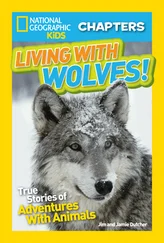But at home we ate well. My grandmother was a good cook. Sundays were her baking days and wonderful smells would waft into the yard. In preparation she would buy eggs to supplement those our chickens laid. One Sunday she couldn’t find the eggs she had bought, and after looking all over, she had to abandon her baking. That evening my grandfather came into the house and said, “I’ve found your eggs, Ma. They’re under the chicken at the top of the garden.” I had taken them and put them under a broody hen to see if she would hatch them.
My grandmother used to sing as she baked, and I will always remember her wearing a blue floral dress. There was always a big stew or a casserole on the stove, made with vegetables that my grandfather grew in the garden and game of one sort or another that we had shot or coursed on the land. I learned to shoot at a very early age, and could always use a knife. I was never squeamish about killing and could skin and gut.
By the age of eight or nine my job was to bring home our meals. My grandmother would make me coarsely cut cheese sandwiches and some cold tea—we never had hot drinks for some reason—and send me out with a penknife, a piece of string, a ten-pence piece—what that was for I have no idea—and tell me I was equipped to conquer the world. And off I would go with the dogs and not come back until I had plenty for everyone to eat.
I didn’t kill indiscriminately. My grandfather had taught me which animals to take and which ones to leave. I knew to leave female rabbits that were nursing their young. From fifty yards, he could spot “milky does,” as he called them, by their lack of condition and the absence of fur on their underbellies. He knew they had young underground that would die if their mother was killed. Instead I learned to go for the young bucks that would otherwise overpopulate the area.
My grandfather’s whole philosophy was about sustainability and about maintaining a balance in nature. Younger farmers wanted to kill off the rabbits because they were so destructive to the crops, but he wanted to protect them, knowing that if you drastically reduced one species, another would take over. He would say that problems arose only when human beings interfered.
CHAPTER THREE
A Wolf at the Window
In bed at night, when I was small and the lights were out, I was convinced I could see a wolf outside my bedroom window. I suppose it must have been the way the branches of a tree fell. As an adult, of course, the idea of a wolf being tall enough to look in through a second-floor window is patently ridiculous, but as a young child, I was convinced. And I was terrified. Every night, to escape, I hid my head under the coarse black blanket that covered me, but then I couldn’t resist peeping to see if it had gone, and would scare myself all over again. It was just the wolf’s head, ears erect, looking to its left; but by morning, in the daylight, there was no sign of it.
I knew a lot about the wild animals around my home when I was small—probably much more than most children of my age—but I knew nothing about those in the wider world. I didn’t see wildlife programs because we had no television, and I didn’t visit a zoo until I was in my late teens because there was no money for that kind of thing. So the only knowledge I had of big and dangerous wild animals was from books and fairy stories. And all I knew about wolves was that they were sly, sinister, fierce, and deadly; and the images of the stories my grandmother told me preyed on my imagination. It was a long, long time before I confronted my fear.
Foxes, on the other hand, were familiar and although they also had a fearsome reputation, I was not scared of them. One night I was startled from sleep by the noise of the old shire horses thundering back and forth across the meadow behind the cottage. There was a full moon, as bright as I’d seen. It was almost like daylight outside, so I pulled on some clothes, told Whiskey to stay under my bed, and crept out of the house. I quietly made my way down toward the edge of the forest to see what was agitating the horses.
What I saw was pure magic. By the time I reached them, the horses had begun to settle and playing among their giant hooves was the most beautiful vixen with four young kits. They were so busy leaping on one another and tearing around that they seemed quite unaware of my presence, so I sat down a short distance away and watched their game unfold.
It was the most exciting sight. I had never watched a fox at close quarters before. All I had seen were glimpses of reddish brown from afar or a tail, with its distinctive white tip, disappearing into the hedge as the animal ran for safety when I was out with the dogs. Out there in the dark—in their environment, not mine—I felt as though I were witnessing another world.
I went home and told no one what I’d seen, but the next night I went back and there they were again. I can only assume that their den was just inside the forest and this was their playground. Once again I sat a short distance away and watched, and once again they ignored me, but allowed me to be there. This went on for several months as the kits grew bigger and stronger preparing to take their part in the world.
Every night I went out for my secret rendezvous—it was intoxicating to find myself welcome among creatures that were instinctively so afraid of man. In time, they were playing in a small semicircle in front of where I sat, but although they showed no hint of nervousness, they never seemed to pay me any attention. Until one night there was a rustling behind me and one of the boldest of the four kits had started to play in the bush behind where I sat. He burst out into the open and raced around me and playfully ambushed one of his siblings. I was no longer an observer; I had become part of their game.
I learned so much about foxes in that time. I watched the vixen bring food for the kits. It is a myth that foxes kill for fun, that they go into a henhouse and kill far more than they can eat. We think that only because they are usually caught in the act and frightened away. If left undetected, the fox will take one hen from the coop, which is all they can carry at a time, and then go back again and again until they have collected everything they killed. They will eat as much as their family needs that day and bury the remainder in the ground, where it keeps. Nothing is wasted. I know because I saw what they did and saw how well this mother looked after her young and taught them how to take care of themselves.
Six months later I saw a sight that filled me with grief and horror. Walking in the woods with the dogs I came across the limp and lifeless body of this boldest fox kit swinging from a tree. It was held by the leg in a crude trap, having died a painful and lingering death. The fact that this creature that I had come to know so well over the months, which had been so majestic, so beautiful, so full of energy, could have been deprived of life in this vile and cowardly way made me embarrassed for my species. I felt sick. I was so angry that some ignorant human being had taken this vibrant young life for no better reason than because he could.
Native Americans would say that that was the moment when my fate was sealed. They say that you sign nature’s unwritten contract to work with animals at a very young age as a result of some experience, either good or bad, that happens in early childhood. Looking back, there is no doubt that the shock of seeing that magnificent young fox—my friend—hanging from that tree left me with a feeling of revulsion for my own kind and a desire to distance myself from the human race.
My concern for foxes put me at odds with the rest of the community. The farmers hated them because in extremis a fox will take a newborn lamb, and the gamekeepers hated them because they took pheasants. So the local hunt was given a free rein to go wherever the scent took them, and it was a popular sport. The results were sickening.
Читать дальше












